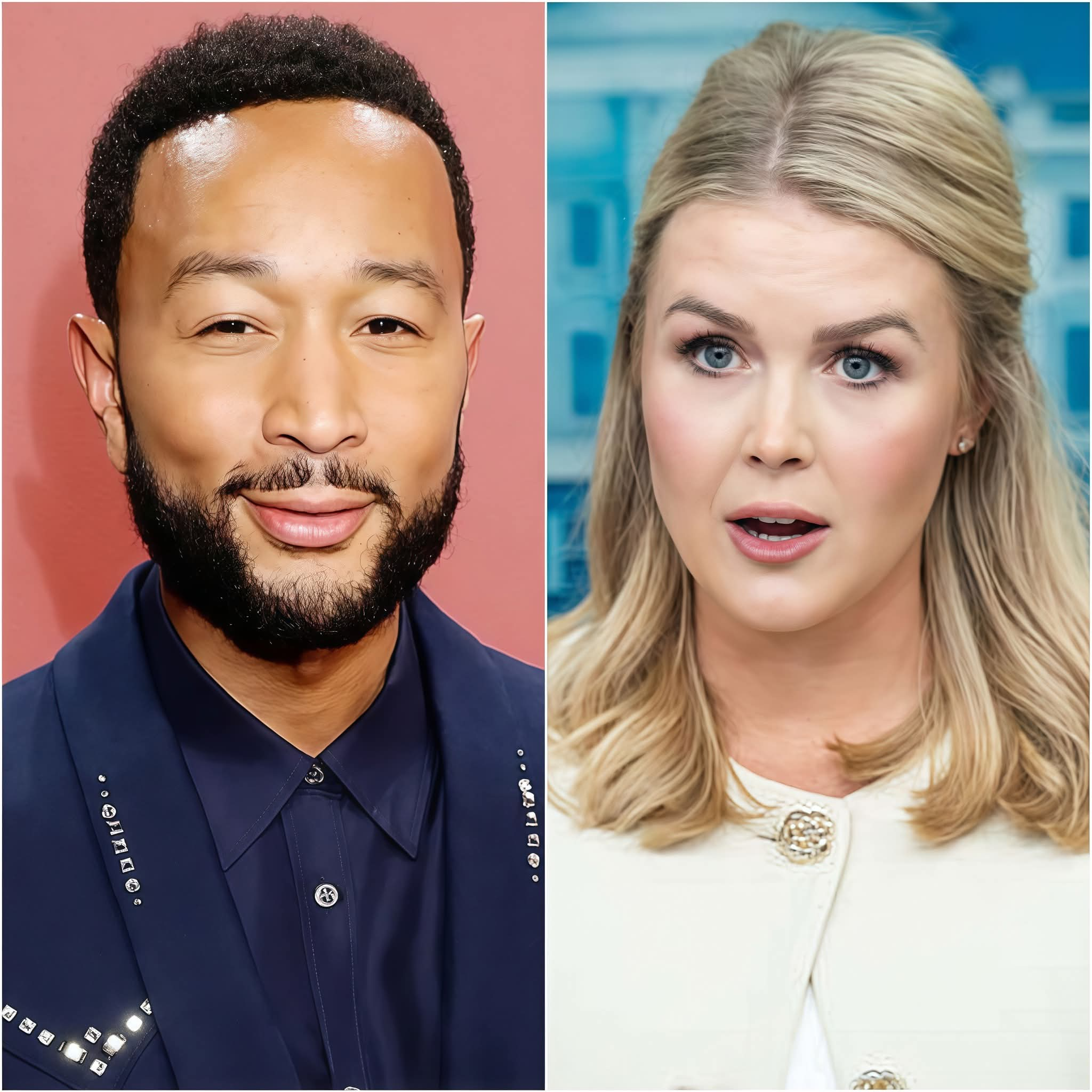CELEBRITY
“HE’S JUST A SINGER.” That’s what Karoline Leavitt said — seconds before the studio shook like a televised earthquake, and John Legend answered with a single line that froze her live on air. At first, John didn’t react. He smiled politely. Took a breath. Waited. But when Karoline kept going… everything shifted. John lifted his head. Rested both hands firmly on the table. And delivered seven words — no more, no less. The cameras kept rolling. But the director didn’t dare whisper “continue.” The audience held its breath. A guest lowered his eyes to the floor. Karoline? Not a word. Just one blink. And then… silence. The man once dismissed as “just a singer with a piano” had just done what no one else had achieved in ten years of live television: he froze the entire studio. Not out of rage. But because everyone suddenly realized — they had misjudged John Legend. The clip is spreading by the hour, not because John looked powerful, but because his words cut straight through decades of polished media façades. So what exactly were those seven words? And why are people calling this the moment a daytime firebrand lost her voice — live on air?

“HE’S JUST A SINGER.”
That’s what Karoline Leavitt said — seconds before the studio shook like a televised earthquake, and John Legend answered with a single line that froze her live on air.
At first, John didn’t react. He smiled politely. Took a breath. Waited. But when Karoline kept going… everything shifted.
John lifted his head. Rested both hands firmly on the table. And delivered seven words — no more, no less.
The cameras kept rolling. But the director didn’t dare whisper “continue.” The audience held its breath. A guest lowered his eyes to the floor. Karoline? Not a word. Just one blink.
And then… silence.
The man once dismissed as “just a singer with a piano” had just done what no one else had achieved in ten years of live television: he froze the entire studio. Not out of rage. But because everyone suddenly realized — they had misjudged John Legend.
The clip is spreading by the hour, not because John looked powerful, but because his words cut straight through decades of polished media façades.
So what exactly were those seven words? And why are people calling this the moment a daytime firebrand lost her voice — live on air?
When Karoline Leavitt muttered those five words — “He’s just a singer, okay?” — she had no idea what was about to happen. It was supposed to be a routine moment: a political strategist brushing off celebrity commentary during a fast-paced panel. A throwaway jab, live on national television.
But seconds later, the studio trembled — not literally, but in the way a room does when something seismic is said. And sitting calmly across the table, John Legend — Grammy-winning artist, EGOT holder, and long-time social advocate — responded not with a raised voice or a clapback, but with seven quiet words that would stop the broadcast cold.
“I use my voice. So should you.”
That was it.
No insult. No shouting match. Just a measured, unshakable line that hit deeper than any soundbite.
Leavitt froze. Not because she had been “owned” or “destroyed,” but because, in that moment, the entire room — and perhaps a piece of the broader public — realized what they had just witnessed: the dismantling of a dismissal decades in the making.
The Dismissal of the Artist
For years, the phrase “just a singer” has served as a way to minimize influence — to suggest that entertainers should entertain, not engage. That artists who speak on politics or justice are somehow stepping out of line.
But history tells a different story.
From Nina Simone to Bob Dylan, from Public Enemy to Joan Baez, music has always been political. Voices have always carried power. And John Legend, whether performing on global stages or testifying before Congress, has never been content to simply sing.
That’s what made Leavitt’s comment feel outdated — and, in the split second after John’s reply, painfully hollow.
Why It Landed
Legend didn’t grandstand. He didn’t accuse. Instead, he redefined what a voice is — and who gets to use it.
“I use my voice. So should you.”
He acknowledged his platform. He invited her to use hers. And in doing so, he exposed the real problem: not that a singer was speaking out, but that someone else was unwilling to listen.
The audience felt it. So did the other guests. And Leavitt? She blinked — just once — and fell silent.
In an era of endless shouting, this wasn’t a battle of egos. It was a moment of clarity. A quiet reminder that the lines between art, activism, and authority are not as rigid as some would like them to be.
The Aftershock
The clip is everywhere now — not because it was explosive, but because it was undeniable. Legend didn’t overpower the room. He revealed something truer: that power doesn’t always shout. Sometimes it just sits still, speaks plainly, and waits for the world to catch up.
And for those who still think John Legend is “just a singer”?
They’re probably not saying it out loud anymore.
In a world addicted to noise, it took seven quiet words to say the loudest thing.











